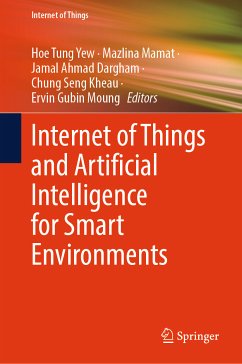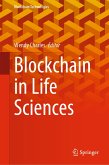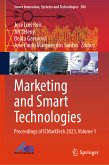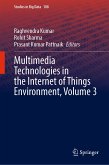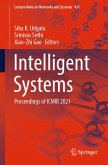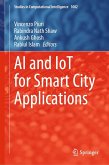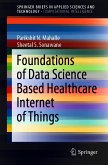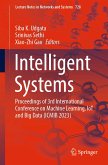Internet of Things and Artificial Intelligence for Smart Environments (eBook, PDF)
Redaktion: Yew, Hoe Tung; Moung, Ervin Gubin; Seng Kheau, Chung; Dargham, Jamal Ahmad; Mamat, Mazlina
40,95 €
40,95 €
inkl. MwSt.
Sofort per Download lieferbar

20 °P sammeln
40,95 €
Als Download kaufen

40,95 €
inkl. MwSt.
Sofort per Download lieferbar

20 °P sammeln
Jetzt verschenken
Alle Infos zum eBook verschenken
40,95 €
inkl. MwSt.
Sofort per Download lieferbar
Alle Infos zum eBook verschenken

20 °P sammeln
Internet of Things and Artificial Intelligence for Smart Environments (eBook, PDF)
Redaktion: Yew, Hoe Tung; Moung, Ervin Gubin; Seng Kheau, Chung; Dargham, Jamal Ahmad; Mamat, Mazlina
- Format: PDF
- Merkliste
- Auf die Merkliste
- Bewerten Bewerten
- Teilen
- Produkt teilen
- Produkterinnerung
- Produkterinnerung

Bitte loggen Sie sich zunächst in Ihr Kundenkonto ein oder registrieren Sie sich bei
bücher.de, um das eBook-Abo tolino select nutzen zu können.
Hier können Sie sich einloggen
Hier können Sie sich einloggen
Sie sind bereits eingeloggt. Klicken Sie auf 2. tolino select Abo, um fortzufahren.

Bitte loggen Sie sich zunächst in Ihr Kundenkonto ein oder registrieren Sie sich bei bücher.de, um das eBook-Abo tolino select nutzen zu können.
This book highlights the application of smart technologies that utilize the Internet of Things (IoT) and Artificial Intelligence (AI) to enhance efficiency and productivity across various industries. It provides a comprehensive review of the latest IoT and AI developments, including their applications, opportunities, and challenges in smart environments. This book is a valuable resource for researchers, engineers, academics, and students working on implementing smart technologies.
- Geräte: PC
- ohne Kopierschutz
- eBook Hilfe
- Größe: 7.05MB
Andere Kunden interessierten sich auch für
![Blockchain in Life Sciences (eBook, PDF) Blockchain in Life Sciences (eBook, PDF)]() Blockchain in Life Sciences (eBook, PDF)40,95 €
Blockchain in Life Sciences (eBook, PDF)40,95 €![Marketing and Smart Technologies (eBook, PDF) Marketing and Smart Technologies (eBook, PDF)]() Marketing and Smart Technologies (eBook, PDF)226,95 €
Marketing and Smart Technologies (eBook, PDF)226,95 €![Multimedia Technologies in the Internet of Things Environment, Volume 3 (eBook, PDF) Multimedia Technologies in the Internet of Things Environment, Volume 3 (eBook, PDF)]() Multimedia Technologies in the Internet of Things Environment, Volume 3 (eBook, PDF)129,95 €
Multimedia Technologies in the Internet of Things Environment, Volume 3 (eBook, PDF)129,95 €![Intelligent Systems (eBook, PDF) Intelligent Systems (eBook, PDF)]() Intelligent Systems (eBook, PDF)169,95 €
Intelligent Systems (eBook, PDF)169,95 €![AI and IoT for Smart City Applications (eBook, PDF) AI and IoT for Smart City Applications (eBook, PDF)]() AI and IoT for Smart City Applications (eBook, PDF)129,95 €
AI and IoT for Smart City Applications (eBook, PDF)129,95 €![Foundations of Data Science Based Healthcare Internet of Things (eBook, PDF) Foundations of Data Science Based Healthcare Internet of Things (eBook, PDF)]() Parikshit N. MahalleFoundations of Data Science Based Healthcare Internet of Things (eBook, PDF)48,95 €
Parikshit N. MahalleFoundations of Data Science Based Healthcare Internet of Things (eBook, PDF)48,95 €![Intelligent Systems (eBook, PDF) Intelligent Systems (eBook, PDF)]() Intelligent Systems (eBook, PDF)177,95 €
Intelligent Systems (eBook, PDF)177,95 €-
-
-
This book highlights the application of smart technologies that utilize the Internet of Things (IoT) and Artificial Intelligence (AI) to enhance efficiency and productivity across various industries. It provides a comprehensive review of the latest IoT and AI developments, including their applications, opportunities, and challenges in smart environments. This book is a valuable resource for researchers, engineers, academics, and students working on implementing smart technologies.
Dieser Download kann aus rechtlichen Gründen nur mit Rechnungsadresse in A, B, BG, CY, CZ, D, DK, EW, E, FIN, F, GR, HR, H, IRL, I, LT, L, LR, M, NL, PL, P, R, S, SLO, SK ausgeliefert werden.
Produktdetails
- Produktdetails
- Verlag: Springer Nature Singapore
- Seitenzahl: 223
- Erscheinungstermin: 4. Juni 2024
- Englisch
- ISBN-13: 9789819714322
- Artikelnr.: 70903825
- Verlag: Springer Nature Singapore
- Seitenzahl: 223
- Erscheinungstermin: 4. Juni 2024
- Englisch
- ISBN-13: 9789819714322
- Artikelnr.: 70903825
- Herstellerkennzeichnung Die Herstellerinformationen sind derzeit nicht verfügbar.
Yew Hoe Tung obtained his Ph.D. degree from Universiti Teknologi Malaysia in Biomedical Engineering. Currently, he is a Senior Lecturer at the Faculty of Engineering, Universiti Malaysia Sabah. He is a Chartered Engineer (CEng) with the Institute of Engineering and Technology, U.K., and a Professional Engineer with the Malaysia Board of Engineers. He is also a Professional Technologist with the Malaysia Board of Technologists (MBOT). His research interests include the general area of wireless communications and, in particular, the area of vertical handover, wireless sensor networks, and the Internet of Things. Mazlina Mamat received the B.Eng. and M.Sc. degrees in electrical and electronic engineering from Universiti Sains Malaysia, in 2000 and 2003, respectively. She received her Ph.D. degree in microengineering and nanoelectronics from Universiti Kebangsaan Malaysia, in 2013. Currently, she is a senior lecturer at the Electronic Engineering (Computer), Universiti Malaysia Sabah. She is also a professional engineer registered with the Board of Engineers Malaysia (BEM). Her research interests include sensors, signal processing, machine learning, and artificial intelligence. Jamal Ahmad Dargham Jamal Dargham received his B.Sc. in Control Systems Engineering from University of Technology, Iraq, in 1984 and his M.Sc. in Control Systems Engineering University of Manchester, UK, in 1987 and his Ph.D. in Image Processing from Universiti Malaysia Sabah in 2008. From 1989 till 1996, he was a lecturer at the Advanced Management College, Sabah. Since 1996, he has been with the School of Engineering and Information Technology, Universiti Malaysia Sabah as a senior lecturer. He was the Program head of the Computer Engineering Program from 2006 till 2011. His main research interests are in Image Processing and Biometrics as well as Engineering Education. He has published more than 70 papers in refereedjournals, conferences, book chapters, and research reports. Chung Seng Kheau received the B.Sc. and M.Sc. degrees in computer science from Universiti Teknologi Malaysia, Johor, Malaysia, in 1997 and 2000, respectively, and the Ph.D. degree in computer science from Universiti Malaysia Sabah, Kota Kinabalu, Malaysia, in 2015. Currently, he is a senior lecturer at the Electronic Engineering (Computer), Universiti Malaysia Sabah. His main research interests are in e-commerce and Internet of Things. Ervin Gubin Moung is a senior lecturer in the Faculty of Computing and Informatics, Universiti Malaysia Sabah. He received his Bachelor of Computer Engineering, Master of (Computer) Engineering, and Ph.D. in Computer Engineering from Universiti Malaysia Sabah (UMS) in 2008, 2013, and 2018, respectively. His research interest generally falls under Computer Vision and Pattern Recognition, such as image processing, image segmentation, imageclassification, object detection, vision-based learning, and big data analytics. His domain of interest includes public health, smart health, agriculture, food security, biodiversity, and environmental sustainability.
Internet-Of-Things: Applications, Challenges, And Future Trends.- IoT-Based Patient Monitoring System.- Enhancing Lettuce Production Quality Through Iot-Enabled Hydroponic Farming: An Optimized Fertilizer System Approach.- Iot Based Vending Machine.- Artificial Intelligence (AI) and the Future of Mankind.- Artificial Intelligence Offline, Online and Reinforcement Learning Approaches in Time Series Air Pollutant Index Prediction.- Artificial Intelligence in Time Series Prediction, Classification, and Sequence-to-Sequence Problems.- Fuzzy-Based Handover Scheme for 5G Heterogeneous Networks.- Estimating Shelf Life of Packed Fresh Milk Using Odor and Machine Learning A Feasibility Study.- Deep Learning Architectures and Their Efficacy in Surveillance Face Recognition A Study with the ChokePoint Dataset.
Internet-Of-Things: Applications, Challenges, And Future Trends.- IoT-Based Patient Monitoring System.- Enhancing Lettuce Production Quality Through Iot-Enabled Hydroponic Farming: An Optimized Fertilizer System Approach.- Iot Based Vending Machine.- Artificial Intelligence (AI) and the Future of Mankind.- Artificial Intelligence Offline, Online and Reinforcement Learning Approaches in Time Series Air Pollutant Index Prediction.- Artificial Intelligence in Time Series Prediction, Classification, and Sequence-to-Sequence Problems.- Fuzzy-Based Handover Scheme for 5G Heterogeneous Networks.- Estimating Shelf Life of Packed Fresh Milk Using Odor and Machine Learning A Feasibility Study.- Deep Learning Architectures and Their Efficacy in Surveillance Face Recognition A Study with the ChokePoint Dataset.
